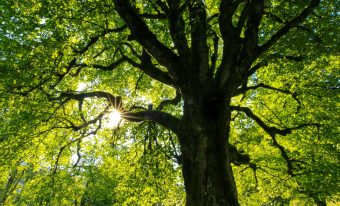
Light pollution, a pressing ecological issue that currently affects over 80 per cent of the world’s population, is a topic of urgent concern. Despite this, the full extent of its impact on plants and animals, and the resulting changes in ecosystems, remains a mystery. This has spurred experts from the Chinese Academy of Sciences in Beijing to delve deeper into this issue.
In a study published in the journal Frontiers in Plant Science, scientists aimed to answer why the leaves of plants in urban areas are less damaged by insects than the leaves of trees in nature. The answer lies in urban night lighting, which, over time, has led to changes in the key functional traits of leaves, making them tougher and more resilient.
It is known that there are similarities between natural and artificial light, with artificial light typically having a limited spectrum, specific wavelengths, and illumination compared to natural light. Therefore, excessive night lighting over a prolonged period can prevent a plant from adapting. Scientists suspected that plants exposed to high levels of artificial light would focus more on defense than growth, producing tougher leaves with more chemical defense compounds and fewer nutrients.
Studies indicate that the intensity of night lighting has exceeded the threshold of plant adaptation, leading to changes in their physiological responses.
“Leaves that insects do not damage can make people happy, but not insects. Herbivory is a natural ecological process that maintains insect biodiversity,” said one of the study authors, Dr. Shuang Zhang, from the Chinese Academy of Sciences.
More:
- Oil Spills Pose a Bigger Threat to Freshwater Ecosystems
- New global fisheries management body’s first meeting focuses on sustainable practices and promoting biodiversity
As herbivores (primarily insects) find it increasingly difficult to access food in urban areas, their survival is at risk. The reduced number of insects further endangers the survival of birds and other species that feed on them, ultimately leading to dramatic biodiversity loss and ecosystem changes.
“The decline in insect numbers is a global pattern observed in recent decades. We should pay more attention to this trend,” said Zhang, noting that night light might also contribute to the reduced number of insects by making them more visible to predators.
Experts warn that the high intensity of night light is detrimental to the flow of energy from urban plants to higher trophic levels, posing a potential threat to maintaining biodiversity (e.g., arthropod diversity, bird diversity) in urban ecosystems. However, further research will be needed to fully understand the effects of artificial light.

